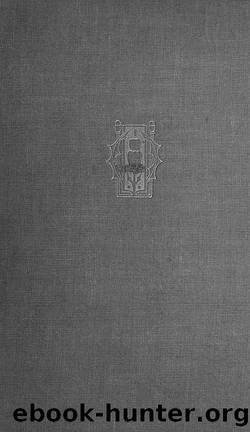In Byways of Scottish History by Louis A. Barbé

Author:Louis A. Barbé [Barbé, Louis A.]
Language: eng
Format: epub
Tags: Fiction, Classics
ISBN: 9785040754052
Google: 9chSEAAAQBAJ
Publisher: Litres
Published: 2021-12-02T03:10:25+00:00
* * *
JAMES VIâAS STATESMAN AND POET
I.âAS STATESMAN
Those who accept the traditional estimate of James VI's character may deem it little short of preposterous to connect his name with the idea of statesmanship. To them he appears as a garrulous pedant and a coarse buffoon, whose rickety walk was the outward sign of a feeble, vacillating temper; as a would-be autocrat who, whilst constantly obtruding his despotic theories on his subjects, lacked the strength of mind and the energy to put them into practice; and, to express it briefly and bluntly in the words of Macaulay, as "a drivelling idiot" and "a finished specimen of all that a king ought not to be".[244] But there is another portrait that may be drawn of him. Materials for it will be found not in the rhetorical descriptions of writers whose aim was literary effect or political denunciation, but in those absolutely trustworthy, if most prosaic and unimaginative documents, the Acts of the Privy Council. And it was Professor Masson, the editor of those records, who asserted that it is impossible for anyone duly acquainted with them "to think of James as other than a man of a very remarkable measure of political ability and inventiveness, with a tenacity and pertinacity of purpose that could show itself in a savage glitter of the eye whenever he was offended or thwarted, and in a merciless rigour in hunting down and crushing his ascertained opponents".[245] It is worth going to the same sources of information for the purpose of determining to what extent this view is justified.
In any attempt at a survey of the administration of James VI it is important to remember that, although he became nominal sovereign at an early age, it was not until he had reached his thirtieth year that he got the reins of government fully into his own hands. That occurred towards the close of 1595, at the death of Lord Maitland of Thirlstane, after a Chancellorship and Premiership of over eight years. It was then that on being asked how he intended to fill up the vacant office, James replied that he was resolved no more to use great men as Chancellors in his affairs, but only such as he could correct and were hangable.[246]
The peculiar idea of kingship or sovereign authority which the enfranchised monarch thus expressed, and which he took every opportunity of repeating in both his speeches and his writings, is the more noteworthy that it was opposed to the principles which must have been inculcated upon him in his early years. For it must be remembered that his tutor, Buchanan, was a politician as well as a scholar, and that it was he who wrote the famous treatise, De Jure Regni apud Scotos, that vigorous exposition of liberal and constitutional monarchy which justifies the description of its author as "the first Whig". It is certainly not to him that James's training in autocracy is to be attributed, but rather to Thirlstane. That statesman, it
Download
This site does not store any files on its server. We only index and link to content provided by other sites. Please contact the content providers to delete copyright contents if any and email us, we'll remove relevant links or contents immediately.
| General | Channel Islands |
| England | Northern Ireland |
| Scotland | Wales |
Room 212 by Kate Stewart(5105)
The Crown by Robert Lacey(4807)
Endurance: Shackleton's Incredible Voyage by Alfred Lansing(4769)
The Iron Duke by The Iron Duke(4350)
The Rape of Nanking by Iris Chang(4203)
Joan of Arc by Mary Gordon(4103)
Killing England by Bill O'Reilly(3997)
Say Nothing by Patrick Radden Keefe(3975)
I'll Give You the Sun by Jandy Nelson(3429)
Shadow of Night by Deborah Harkness(3361)
Hitler's Monsters by Eric Kurlander(3329)
Mary, Queen of Scots, and the Murder of Lord Darnley by Alison Weir(3208)
Blood and Sand by Alex Von Tunzelmann(3195)
Eleanor & Park by Rainbow Rowell(3153)
Darkest Hour by Anthony McCarten(3119)
Margaret Thatcher: The Autobiography by Thatcher Margaret(3080)
Book of Life by Deborah Harkness(2933)
Red Famine: Stalin's War on Ukraine by Anne Applebaum(2929)
The One Memory of Flora Banks by Emily Barr(2857)
